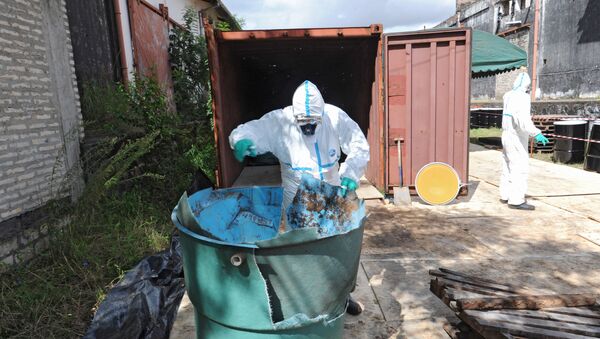To avoid the accumulation of waste, researchers' efforts are aimed at at promoting recycling and reusing waste in industrial processes as secondary raw materials. Russian scientists contribute to this process. Researchers of universities participating in Project 5-100work on unique high-tech scientific developments that will allow people to conserve resources in both everyday life and in the nuclear industry.
Road Soil From Waste
Researchers of the Energy Efficiency Center at the National University of Science and Technology MISiS (NUST MISiS) have recently developed a new technology for producing a wide range of soil modifiers from industrial waste. The researchers believe that using these soil modifiers at worksites will improve physical properties of soil, thus reducing the cost of road construction.
READ MORE: As Heathrow Expanded, Will Boris Johnson 'Lie Down In Front of Bulldozers'?
Every year the power, steel and chemical industries produce hundreds of millions of tons of waste, noted Stanislav Mamulat, head of the Center for the Development of Corporate Collaboration at NUST MISiS.
"The use of this waste for strengthening the soil will not only reduce the cost of regional and municipal road construction while increasing its quality, but it will also solve environmental problems in the regions," Mr. Mamulat said.
Cast Iron From Sludge
In cooperation with one of the university's industrial partners, a group of NUST MISiS researchers led by the head of the NUST MISiS Research and Education Center IMT Gennady Podgorodetsky created and launched a prototype of an airlift reactor (based on a gas purging approach) for efficient and environmentally friendly production of iron and non-ferrous metal concentrates from waste sludge. Experts believe that successful testing of this new technology and further replication of such units will be a new step in creating facilities for non-waste production of ferrous and non-ferrous metals, and a positive and powerful environmental factor in the future.
READ MORE: Anti-Sustainability: Trump Orders DoE to Keep Fading US Coal Industry Alive
Hundreds of millions of tons of waste in the form of sludge, grime, cinders, etc. accumulate as a result of producing ferrous or non-ferrous metals and chemical products. This waste contains large amounts of metals that cannot be extracted due to a lack of effective industrial technologies that would enable industries to get the useful components.
"Due to the unique design of the unit, the use of energy carriers can be reduced to 500 kg of coal and 500 nm3 of oxygen per ton of cast iron," Mr. Podgorodetsky said. "As a result of recycling the unusable industrial waste, we can reclaim cast iron, commercial slag, and non-ferrous metals concentrate. There is no waste in our technology."
According to the researcher, the main advantage of the new unit is that it allows reducing the use of energy carriers (by 20-30 percent in comparison with world analogs). Scientists note that emission levels from the new technology are significantly lower than those of similar units in the world and that the new unit can also suppress the generation of, particularly hazardous eco-toxicants.
Animal Feed From Tropical Manihot
In cooperation with the Excellent Center of Waste Utilization and Management (ECoWaste) at the King Mongkut University of Technology Tongburi (KMUTT) in Thailand, scientists from the Food Security Research Center at Novosibirsk State University (NSU) have studied the most promising uses and ways to process cassava raw material waste. This project was carried out as part of Project 5-100, and its key areas include financing the research conducted in collaboration with international scientific organizations.
Cassava, or edible Manihot esculenta, is an essential edible tropical root plant. Thailand is the largest exporter of high-quality natural cassava starch in the world, and it accounts for 70 percent of the world's cassava starch market. The rapid growth of industrial production of cassava starch results in increased revenues from sales, but at the same time, it leads to an increasing amount of waste and a significant increase in environmental risks, especially with the country's hot and humid climate.
Together with their colleagues from Thailand, NSU researchers gathered and analyzed data in questionnaires from 70 factories in Thailand that produce cassava starch for export. Later, they presented the results of the economic and environmental assessment of the alternatives to the utilization of solid waste from the production of natural cassava starch, namely, the results of comparing the two ways of generating value added from waste: the production of fermented animal feed and plant substrates for mushroom cultivation.
READ MORE: ‘Awestruck': Research Shows Global Meat Industry's Outsize Ecological Footprint
Both types of products are currently in high demand on the Thai market, said Yulia Otmakhova, head at the NSU Food Security Research Center.
"Over 3 million households in this country are engaged in livestock breeding; fermented foods that are rich in protein increase the nutritional value for animals and reduce feed costs," Ms. Otmakhova noted.
In 2015, the production of mushrooms in Thailand totaled almost 19 million tonnes with estimated sales of about $20.5 million, Ms. Otmakhova said.
Mushrooms From Coffee Grounds
Researchers from ITMO University have come up with a new startup called Coffee Cycle for the environmentally friendly cultivation of mushrooms using coffee grounds. Experts believe that the new development is a perfect example of effective use of recycling trends for domestic purposes.
"We are planning to cooperate with restaurants which will provide us with coffee grounds," said Alyona Nikolayeva, one of the researchers in the project. "We will use them for creating kits for cultivating mushrooms at home." She says that there are similar companies abroad, small mushroom companies that sell mushrooms and kits for cultivating mushrooms at home.
READ MORE: Coffee Waste Now Costs 480% More Than Coffee Beans Amid Rising Demand in US
Ms. Nikolayeva believes that the project has potential, as it is an affordable alternative to growing foods on a windowsill: Coffee Cycle researchers state that the mushrooms will grow in just 10 days. The specialists are also planning to implement this development in education, introducing their kits into the educational process at schools and kindergartens.
Fuel From Nuclear Waste
In cooperation with National Research Center Kurchatov Institute researchers from National Research Nuclear University MEPhI have developed a new software package for simulating nuclear fuel handling processes carried out as part of the Proryv (Breakthrough) Russian nuclear project.
This project is aimed at testing nuclear fuel cycle closure technologies based on fast neutron reactors, thus allowing researchers to address the issue of managing hazardous radioactive waste.
The main advantage of fast neutron reactors over fusion reactors is that humanity has enough fuel to sustain them for tens of thousands of years. This fuel has already been extracted; it is now stored in warehouses and waste dumps. The main advantage of this type of reactors is that researchers can use uranium-238 and thorium-232 in the nuclear fuel cycle.
Scientists also note that fast reactors produce 20 percent more neutrons per fission than thermal neutron reactors, which is sufficient for starting a chain reaction and generating new fuel.
Products From Waste
The issue of waste management and recent scientific developments of Russian universities participating in Project 5-100 are becoming increasingly relevant, taking into account recent legislative changes in Russia: on January 1, 2018, a new law prohibiting the disposal of waste that contains usable components entered into force. This law applies to non-ferrous and ferrous metal scrap, mercury-containing products, wastepaper and tires. By 2024 the law will apply to all unsorted waste.
Many countries already sort solid municipal waste, turning garbage into raw materials, and they have done this for some time. This common practice ensures non-stop operation of many enterprises. For instance, hundreds of tonnes of waste from the United States of America are delivered to the Chinese Port of Shenzhen every day to be recycled and turned into products that can be used in China and many other countries.





